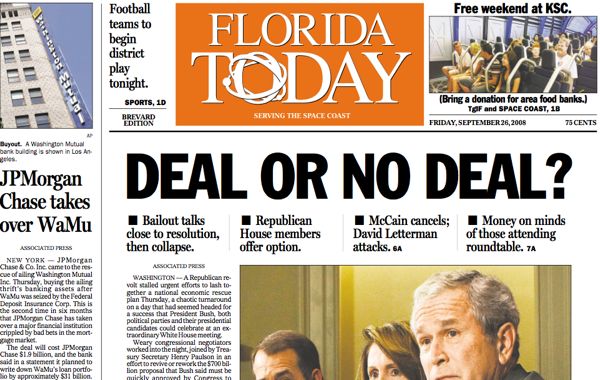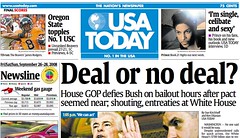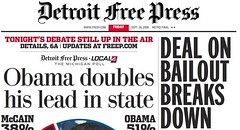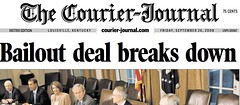
I thought this headline was original when I wrote it. Six hours later, I saw the first copy of USA Today, and my jaw dropped to the floor.
 Since President Bush's televised address about the economy Wednesday night, The Associated Press has been referring to the White House summit he arranged as an "extraordinary" event.
Since President Bush's televised address about the economy Wednesday night, The Associated Press has been referring to the White House summit he arranged as an "extraordinary" event.So it's no wonder that most newspapers treated it as such Friday morning, when they printed stories about the meeting and negotiations on Capitol Hill for a $700 billion economic bailout package.
And the headlines that those news outlets used to describe what was happening also were quite in agreement. Sixteen newspapers used "Deal or no deal?" to express how political leaders led the public to believe they were close to a deal, but later on, said the talks had collapsed. Four of those were Florida papers in Miami, Orlando, Ocala and Melbourne. Some papers had variations on the headline. The Rocky Mountain News inserted a handy comma after the first "deal," creating a natural pause. But, interestingly, the Sun Herald in Biloxi, Miss., omitted the question mark. I would think it's necessary in such a headline.
 But 41 newspapers, according to my survey of front pages on display on the Newseum's Web site, used some form of "breakdown," "break down" or "breaks down" as their headline for the bailout package.
But 41 newspapers, according to my survey of front pages on display on the Newseum's Web site, used some form of "breakdown," "break down" or "breaks down" as their headline for the bailout package.What this sameness indicates to me is a sameness in today's news reporting. For the past several years, newspapers have been eliminating their bureaus in Washington, D.C. So, with most newspapers depending on their corporate wire services - such as Gannett News Service or McClatchy Tribune Information Services - along with the AP, many stories coming out of this summit were the same and, naturally, a similar headline came from the copy editors reading the stories. Relying on a single news service eliminates the likelihood that off-beat stories and more unique headlines would arise from this historic occasion.
 FLORIDA TODAY was not immune to this, of course. We've been relying on the AP for much of our copy throughout this economic debacle. During late-breaking news situations, the AP is especially good at running stories early so we can make deadline.
FLORIDA TODAY was not immune to this, of course. We've been relying on the AP for much of our copy throughout this economic debacle. During late-breaking news situations, the AP is especially good at running stories early so we can make deadline.I was charged with designing the front page for the bailout summit package. Usually, I would design around the art, but the photos coming from Washington have been particularly ho-hum during this crisis. Bush, Nancy Pelosi and Roy Blunt aren't very high on the sexiness meter. So, with this package, I first thought of a headline that came naturally from the story, which had this lede: "A Republican revolt stalled urgent efforts to lash together a national economic rescue plan Thursday, a chaotic turnaround on a day that had seemed headed for a success that President Bush, both political parties and their presidential candidates could celebrate at an extraordinary White House meeting." And I had it on the page early: 6:30 p.m., about five hours before deadline.
After a scurry toward the finish (deadline), I took a sigh of relief that the page was sent to the press. But about an hour later, my heart jumped again. That's when one of the pre-press workers came out with a copy of FLORIDA TODAY and an edition of USA Today, which is printed in Melbourne, too. Both had the same headline.
Does this mean that both newspapers covered the news the way it should have been - straightforwardly? Or does it mean that all media are blending into one giant entity, creating little need to pay attention to more than one news source? It used to be that you could read two different newspapers about the same topic and get two antithetical stories. Is that a bygone era?
If I could do it all again, I still would probably choose the "Deal or no deal?" headline. It's more engaging for the reader than "Bailout breaks down" or "Bailout stalls," another word used widely Friday.
 Update: Executive Editor Bob Stover writes a column that mentions the headline issue and asks similar questions: Cliche? Appropriate?
Update: Executive Editor Bob Stover writes a column that mentions the headline issue and asks similar questions: Cliche? Appropriate?I created a few galleries with the 16 and 41 headlines.
"Deal or no deal?"
"Breaks down" or "breakdown"



No comments:
Post a Comment